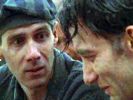Eye For Film >> Movies >> Bent (1997) Film Review
Adapted from the stage play of the same name and helmed by theatre director Sean Mathias, Bent is a solid - though short and stagey - study of repression, love and identity that benefits from two good lead performances.
Clive Owen plays Max - a seemingly vapid party organiser in the decadent warehouse nightclub scene of Berlin during the early years of Nazi Germany. He regularly humiliates his lover and roommate, Rudy, always with the justification: "I'm a rotten person.” Frequently seen at the local industrial-tinged club owned by the androgynous maitre'd Greta, (a bizarre turn from Mick Jagger) Max wanders from one drug and alcohol fuelled encounter to encounter, seemingly uncaring that Germany is changing around him. After a tryst with a gay soldier from a Nazi militia 'SA' unit, Max and Rudy suddenly find themselves hunted by the Gestapo as Hitler moves to destroy his enemies within the Nazi party (many of whom are clearly not strangers to the tastes of the homosexual underworld).

Max finds his wealthy (and very closeted) uncle Freddie (Ian McKellen,who also appeared in the stage version), who has connections to assist him escape from Germany. Freddie is only able to acquire papers for Max, who, out of some odd feeling of loyalty to his dimwitted lover, refuses to leave. Captured and put on a train to Dachau, Max hides his homosexuality and pretends he is Jewish, believing it will mean avoiding worse treatment. Eventually, Max finds love, and the ability to accept who he is, in the person of openly gay captive Horst (Lothaire Bluteau).
Praised during its initial theatrical run for highlighting the plight of homosexuals under Nazi Germany, the continuing revelations over recent decades in print and on film of the nature of the Nazis have perhaps lessened Bent's impact when viewed today. Other films have trodden this ground before. The film also suffers in the second half from being somewhat claustrophobic and overly theatrical in its depiction of Dachau and the mindless tasks Max and Horst must endure (they are forced to literally move rock piles from one spot to another ad infinitum), though this section of the film packs the greater emotional punch.
The earlier scenes highlighting the decadent, corrupt, Cabaret-like atmosphere of Berlin during the early years of the Nazi regime are far more lively and intriguing. It is fascinating to see this underground gay scene continuing to blindly roll on under Nazi rule, a bubble world just waiting to be tragically burst having survived on the hypocrisy and blind eye of its rulers too long.
The film is also arguably not very technically sophisticated or stylistically consistent. It also seems too short, though this might be a limitation of the theatrical material. But these faults are compensated for by actors Owen and Bluteau, who essentially carry the film alone for its second half. In particular one scene stands out - surely one of the most unusual lovemaking moments ever shot; an act without any physical touching or even exchange of looks between them given the scrutiny of their guards. Writing and acting of this calibre help elevate Bent into a far more effective tribute to the human spirit than it might otherwise have been.
Reviewed on: 14 Sep 2010



















